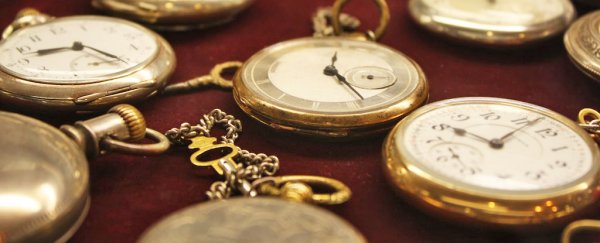The reason we turn up late may vary depending on our age, researchers have found, with younger people more influenced by outside factors and older people trusting more in their internal clock.
What's more, the study shows that our past experiences – like how long we think it takes to get to work from home – play a part in helping us keep time in the future.
The research team, from Washington University in St. Louis, wanted to look at how young and old people vary in the way they plan ahead for tasks and try to meet deadlines.
And the good news is our time-keeping seems to stay sharp even as we get older.
"Our results, while preliminary, suggest that time-management ability and the ability to perform some types of complex time-based tasks in real life may largely be preserved with age," says one of the researchers, Emily Waldum.
For the first part of the study, 36 college undergraduates and 34 healthy older adults in their 60s, 70s, and 80s were asked to keep track of how long it took to complete a quiz.
The quiz always ran for the same time – 11 minutes – but the participants didn't have access to a clock, and were asked to make their own estimates.
Some had to complete the quiz with no background noise, while others had either two long songs or four short songs playing in the background, to see if this had any effect on their time-keeping.
In the second half of the study, the same volunteers had 20 minutes to both complete a puzzle and run through the earlier quiz again, testing their ability to plan ahead as well as their earlier estimates of how long the quiz had lasted.
Technically it's known as a time-based prospective memory (TBPM) experiment, requiring accurate time estimates and the need to do something at a particular time, and tests like these are designed to reflect the same mental calculations we have to make every day when we work out whether we can squeeze a shower in before we meet a friend for coffee.
So how did our volunteers do? The seniors managed to complete the puzzle 'on time' (leaving what they thought was enough time for the quiz) at about the same rate as the undergraduates.
That actually contradicts previous research on TBPM and growing older, that suggests younger people are usually more accurate.
The older adults in the study also reported ignoring the background songs and relying on their own internal clocks to estimate the length of the quiz.
Overall they tended to underestimate how long the quiz took, which does match with what we already know about differences in time perception as we get on in life.
A clock was made available during the puzzle part of the test, and again the senior volunteers tended to trust their internal time-keeping, checking the clock less often than the undergraduates.
That may be because older people shy away from the extra cognitive effort of multitasking, the researchers say, even when watching the clock is obviously the best method of tracking time.
For the younger group, what they heard had a much bigger impact on whether or not they correctly estimated the quiz length, suggesting their perception of time is less dependent on an internal clock.
"When younger adults heard two long songs during the first quiz, they performed a lot like older adults, underestimating the quiz duration and winding up a bit late," explains Waldum.
"When they heard four short songs, younger adults overestimated how much time they would need to repeat the quiz, leading them to finish it too early."
So what can we learn from this? Relying on external factors is actually a good time-keeping strategy in some cases where you don't have access to a clock, such as when you're watching a 30-minute show, the researchers suggest. When the background events are less predictable, though, it falls apart.
The team behind the study recommends trusting your internal clock – or even better, an actual clock – if you want to stay punctual.
"Even if you think you estimated the duration of events accurately, external factors unrelated to that event can bias time estimates," adds Waldum.
"Something as simple as the number of songs you heard play on your phone during a run can influence whether you over- or under-estimate the duration of the run."
The findings have been published in the Journal of Experimental Psychology: General.
